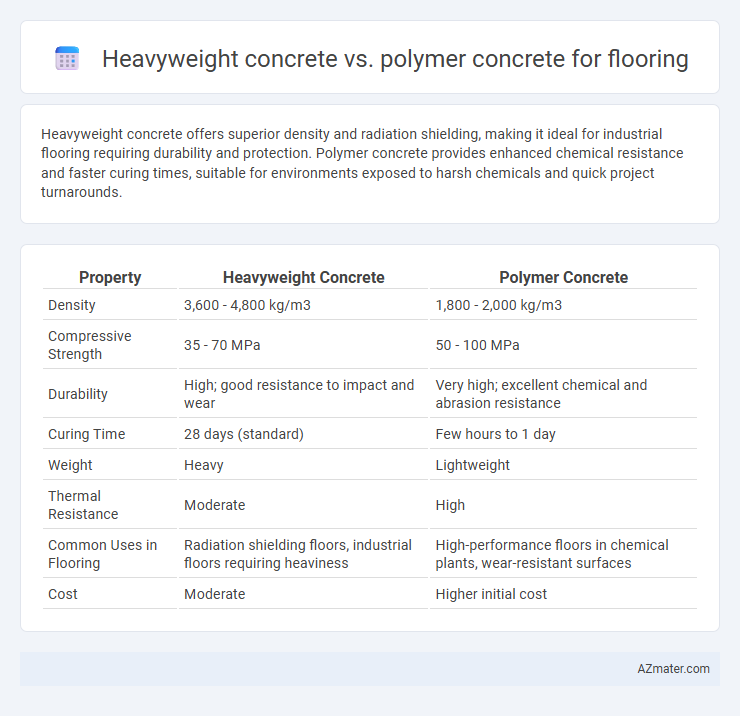Heavyweight concrete offers superior density and radiation shielding, making it ideal for industrial flooring requiring durability and protection. Polymer concrete provides enhanced chemical resistance and faster curing times, suitable for environments exposed to harsh chemicals and quick project turnarounds.
Table of Comparison
| Property | Heavyweight Concrete | Polymer Concrete |
|---|---|---|
| Density | 3,600 - 4,800 kg/m3 | 1,800 - 2,000 kg/m3 |
| Compressive Strength | 35 - 70 MPa | 50 - 100 MPa |
| Durability | High; good resistance to impact and wear | Very high; excellent chemical and abrasion resistance |
| Curing Time | 28 days (standard) | Few hours to 1 day |
| Weight | Heavy | Lightweight |
| Thermal Resistance | Moderate | High |
| Common Uses in Flooring | Radiation shielding floors, industrial floors requiring heaviness | High-performance floors in chemical plants, wear-resistant surfaces |
| Cost | Moderate | Higher initial cost |
Introduction to Concrete Flooring Solutions
Heavyweight concrete offers superior density and strength ideal for industrial flooring requiring high load-bearing capacity and radiation shielding. Polymer concrete provides enhanced chemical resistance, rapid curing times, and increased durability, making it suitable for environments exposed to aggressive chemicals or frequent maintenance. Selecting between heavyweight and polymer concrete depends on specific application requirements such as load capacity, environmental conditions, and installation timelines.
Understanding Heavyweight Concrete
Heavyweight concrete is distinguished by its use of high-density aggregates such as barite, magnetite, or hematite, resulting in a density typically ranging from 3000 to 4000 kg/m3, which provides superior radiation shielding and structural strength compared to standard concrete. This type of concrete is ideal for flooring applications requiring enhanced load-bearing capacity and durability under heavy mechanical stress or radiation exposure, commonly found in industrial and medical facility environments. In contrast to polymer concrete, heavyweight concrete offers greater compressive strength and thermal stability, making it a preferred choice where long-term performance and resistance to high-impact forces are critical.
What Is Polymer Concrete?
Polymer concrete is a composite material consisting of resin binders combined with aggregates such as sand, gravel, or quartz, offering superior chemical resistance and rapid curing times compared to traditional heavyweight concrete. Unlike heavyweight concrete, which relies on dense aggregates like barite or magnetite for increased mass and durability, polymer concrete provides enhanced adhesion and flexibility, making it ideal for flooring applications requiring high resistance to corrosion and mechanical stress. This advanced composition enables polymer concrete floors to withstand extreme conditions while maintaining structural integrity and aesthetic appeal.
Material Composition and Properties Comparison
Heavyweight concrete incorporates dense aggregates like barite or magnetite, resulting in high density and excellent radiation shielding properties, while polymer concrete uses resin binders combined with aggregates such as quartz or silica, offering superior chemical resistance and rapid curing times. The compressive strength of heavyweight concrete typically ranges between 20-40 MPa, whereas polymer concrete can exceed 70 MPa, making it more durable under heavy mechanical stress. Thermal expansion in polymer concrete is lower compared to heavyweight concrete, enhancing dimensional stability in temperature-variable environments.
Strength and Durability: Which Performs Better?
Heavyweight concrete, known for its high density and compressive strength, typically offers superior load-bearing capacity, making it ideal for heavy-duty flooring applications. Polymer concrete, reinforced with polymer resins, provides enhanced chemical resistance and improved tensile strength, contributing to exceptional durability under harsh environmental conditions. In terms of strength and durability, heavyweight concrete excels in structural support, while polymer concrete outperforms in resistance to abrasion, chemicals, and moisture, making the choice dependent on specific flooring requirements.
Installation Process and Ease of Application
Heavyweight concrete requires meticulous mixing and precise placement due to its density, often necessitating specialized equipment for installation, which can extend project timelines. Polymer concrete offers faster curing times and improved workability, allowing for quicker application with standard tools and reduced labor costs. The ease of application with polymer concrete results in less surface preparation and minimal finishing effort compared to heavyweight concrete.
Resistance to Chemicals, Moisture, and Abrasion
Heavyweight concrete offers superior resistance to abrasion and high mechanical strength, making it ideal for industrial flooring subjected to heavy loads. Polymer concrete provides enhanced chemical resistance and excellent moisture impermeability due to its polymer binder, preventing degradation from acids, alkalis, and solvents. Combining heavyweight aggregates with polymer matrices can optimize flooring performance by maximizing durability against chemicals, moisture, and abrasion.
Cost Analysis: Initial Investment and Maintenance
Heavyweight concrete typically involves higher initial investment due to the use of dense aggregates like barite or magnetite, increasing material costs compared to polymer concrete, which uses resin binders and can be more expensive upfront depending on resin type. Maintenance costs for heavyweight concrete are generally lower, benefiting from high durability and resistance to wear, while polymer concrete, although resistant to chemicals and corrosion, may require more frequent inspections and repairs due to potential resin degradation under UV exposure or heavy mechanical stress. Overall, heavyweight concrete offers a cost-effective option for flooring in industrial settings demanding longevity, whereas polymer concrete suits environments needing chemical resistance, but at a potentially higher lifecycle cost.
Environmental Impact and Sustainability Factors
Heavyweight concrete, typically composed of natural aggregates such as barite or magnetite, offers exceptional radiation shielding but has a higher environmental impact due to mining and transportation emissions. Polymer concrete utilizes resins and recycled aggregates, reducing carbon footprint and enhancing durability, which supports sustainable building practices. Selecting polymer concrete can contribute to green construction initiatives by minimizing waste and promoting resource efficiency compared to traditional heavyweight concrete.
Choosing the Right Concrete for Your Flooring Needs
Heavyweight concrete offers superior density and strength, making it ideal for industrial flooring that requires high load-bearing capacity and radiation shielding. Polymer concrete provides enhanced chemical resistance and faster curing times, which benefits environments exposed to corrosive substances and where minimal downtime is critical. Selecting the right concrete depends on factors like load requirements, exposure conditions, and maintenance needs to ensure optimal durability and performance.

Infographic: Heavyweight concrete vs Polymer concrete for Flooring
 azmater.com
azmater.com